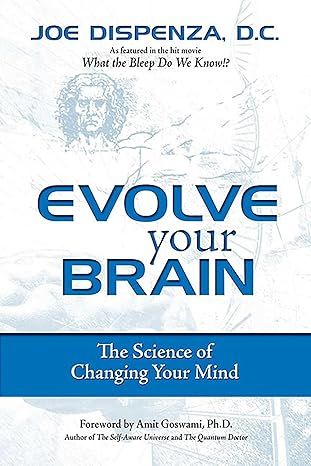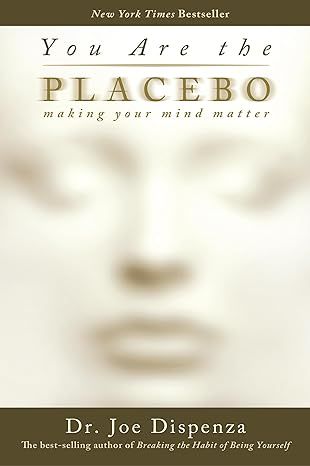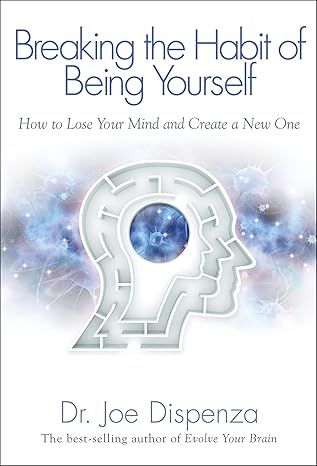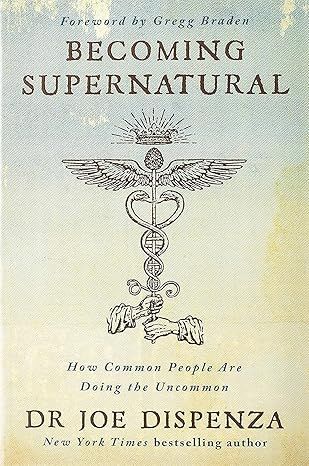Evolve Your Brain: The Science of Changing Your Mind
4.7 out of 5
2,343 global ratings
Why do we keep getting the same jobs, taking on the same relationships, and finding ourselves in the same emotional traps?
Dr. Joe Dispenza not only teaches why people tend to repeat the same negative behaviors, he shows how readers can release themselves from these patterns of disappointment.
With the dynamic combination of science and accessible how-to, Dispenza teaches how to use the most important tool in ones body and life—the brain. Featured in the underground smash hit of 2004, "What the Bleep Do We Know!?," Dispenza touched upon the brain's ability to become addicted to negative emotions. Now, in his empowering book Evolve Your Brain he explains how new thinking and new beliefs can literally rewire one's brain to change behavior, emotional reactions, and habit forming patterns.
Most people are unaware of how addicted they are to their emotions, and how the brain perpetuates those addictions automatically. In short, we become slaves to our emotional addictions without even realizing it. By observing our patterns of thought, and learning how to 're-wire the brain' with new thought patterns, we can break the cycles that keep us trapped and open ourselves to new possibilities for growth, happiness and emotional satisfaction.
Key Features
A radical approach to changing addictive patterns and bad habits.Based on more than twenty years of research.Bridges the gap between science, spirituality and self-help—a formula that has proven success.Easy to understand and written for the average reader.
528 pages,
Kindle
Audiobook
Hardcover
Paperback
Audio CD
First published October 21, 2008
ISBN 9780757307652
About the authors
Joe Dispenza
A New York Times best-selling author, researcher, lecturer, and corporate consultant, Dr Joe Dispenza has developed a practical formula to help people transform their lives.
Dr Joe’s mission unifies complex branches of science in an approachable way – focused on proven research, “Stories of Transformation” testimonials, and the scientific data behind spontaneous remissions. Inspired by the latest findings in neuroscience, psychoneuroimmunology, epigenetics, and quantum physics, his work integrates essential knowledge about the mind-body connection – which teaches people how to heal various health conditions and make significant changes in their lives.
Since 2010, he has partnered with renowned scientists and universities – including University of California San Diego, Harvard University, Stanford University, and others – to perform extensive research on the effects of meditation on the brain and body.
During research studies conducted at his seven-day advanced retreats around the world, Dr Joe and his team have gathered more than 20,000 brain scans (quantitative QEEG and fMRI) and more than 10,000 heart-rate variability (HRV) measurements. Their findings demonstrate the effects of sustained, elevated states of mind and emotions – and how self-regulation produces significant effects on heart and brain function, immune response, and overall mind-body health.
Working with thousands of novice and advanced meditators in these studies, Dr Joe and his team have analyzed a database of 3,000 blood metabolites collected before and after the retreats. Using pre- and post-samples, they have studied epigenetic and microbiome changes, a gross spectrum of urine metabolites, and the healing effects of breast milk.
Dr Joe’s team also has conducted extensive research on cancer, Alzheimer’s disease, and neurogenesis – as well as the effects of advanced meditators’ natural resistance to the COVID-19 virus; isolating a specific protein that strengthens the immune responses. The team also has measured how intention can directly influence gene expression and protein regulation. They have measured changes in cellular mitochondrial function, endogenous opioids, neurotransmitters, telomere length, and variations in bioactive cellular metabolic particles.
Research studies conducted at their retreats also include speech analysis to better understand the language of transformation and transcendental experiences; studies on twins and closely bonded pairs; the use of random-event generators to measure changes in collective consciousness; and the biological effects of in-person as well as Remote Coherence Healing™ sessions.
Dr Joe and his team are expanding their reach to include communities in need around the world. They’ve worked with more than one thousand children to study the effects of meditation in a school setting; veterans – including U.S. Navy SEALs – and others suffering with post-traumatic stress disorder; inmates at prisons in the U.S. and Mexico; indigenous tribes in the U.S.; and children diagnosed with Autism Spectrum Disorder. Teaching self-regulation through heart and brain coherence, they’re bringing healing to some of the world’s most vulnerable populations.
Read more
Reviews
Maili Bradley
5
Anyone with a brain should read this book.
Reviewed in the United States on February 15, 2010
Verified Purchase
This book is truly a life-changer; after reading it, nothing will look the same- nothing. While reading the first chapter, I even felt a little tingly, as if my eyes (and mind) had just been opened for the first time. If you're ready for some seriously scientific mind expansion, this is where you'll find it.
The first chapter is an overview of what you can expect to learn about in the book, then Dispenza gets into some heavy neuroanatomy-speak. Honestly, I plowed through this section because another Amazon reviewer said the rest of the book would make more sense if I stuck with it, but I don't know if I agree with that. While Dispenza does try to simplify the material, I found all the technical and mechanical explanations rather tough to sift through, and instead found myself just sort of gliding over the pages, waiting to get to the good parts. Funnily enough, later on in the book Dispenza talks about becoming disciplined in the art of completely focusing your attention on something, as the only way to truly absorb it. Even though I don't feel as though I had to understand the difference between a peptide and neurotransmitter to get what I needed out of this book, touché, Dr. Dispenza, touché.
The rest of the book is so wonderful, I didn't want it to end. I was actually a bit sad to turn the last page, and am now searching hungrily for something worthy enough to follow it. I've read a good deal on the Law of Attraction (from The Secret to Conversations with God to the Abraham series), and found that much of this book- and all the documented scientific findings contained within- parallel almost to the letter the tenets of LOA. It was an absolute mindblow. If you've read any books on the subject, you'll find that it's the same basic material, just with different wording. I've told everyone I know about this book, and highly recommend it!! Enjoy!! :)
Read more
34 people found this helpful

Daniel Benor, MD
5
This book is a good read as well as being very informative.
Reviewed in the United States on November 28, 2016
Verified Purchase
Joe Dispenza is a holistic chiropractor. He came into very deep understandings of the mind-body connection early in his career, when he suffered multiple spinal fractures in being knocked off his bike by a speeding car. He was given very strong advice from several neurosurgeons to have extensive surgery, with warnings that without surgical interventions he was likely to end up paralyzed from the chest down. Despite these dire predictions, he refused surgery and chose to use conservative physical measures and intensive meditative and imagery exercises. His personal success was a big boost to him in furthering his holistic career.
Dispenza has gone on to help many other people deal with their physical problems through mind-body interventions. He shares much that is helpful to those who want to know how to help themselves, from his rich experiences in these approaches.
The people I spoke with who experienced a spontaneous remission believed that a higher order or intelligence lived within him or her. Whether they called in the ir divine, spiritual, or subconscious mind, they accepted that an inner power was giving them life every moment, and that it knew more than they, as humans, could ever know. Furthermore, if they could just tap into this intelligence, they could direct it to start working for them.” (p. 39)
He explains when we change our views of the world and our relationships with the world, we can change our physical states of being. I find it peculiar, however that Dispenza prefers the term ‘spontaneous remission’ to describe recoveries from medically incurable problems. In my view, these are truly ‘remarkable recoveries.’ (Benor, web reference)
Dispenza presents clear explanations of the theoretical basis for his approaches.
If you think that our brain – being the site of us, or our consciousness– has the capacity to change possibility into actuality, think again. According to quantum physics, the brain itself consists of quantum possibilities before we measure it, before we observe with it. If we, our consciousness, were a brain product, we would be possibilities as well, and our “coupling” with the object would change neither the object nor us (our brain) from possibility to actuality. Face it! Possibility coupled to possibility only makes a bigger possibility.
The paradox only thickens if you think of yourself dualistically– you as a nonmaterial dual entity, not bound by quantum laws and separate from your brain. But if you are nonmaterial, then how do you interact with your brain, with which you have not a thing in common? This is dualism, a philosophy intractable as a science.
There is a third way of thinking, and this one leads to a paradigm shift. Your consciousness is the primary fabric of reality, and matter (including the brain and the object you are observing) exists within this fabric as quantum possibilities. Your observation consists of choosing from the possibilities the one facet that becomes the actuality of your experience.
Read more
88 people found this helpful
Mickey Brix
5
Take control of your own existence.
Reviewed in the United States on May 19, 2022
Verified Purchase
This book is eye opening on so many levels but mainly because it gives you the tools to create the life you want by helping you become the person you wish to be. It supports the concepts through science as well as real life examples of what we would have (prior to reading the book) called extraordinary. It is very heavy in the science of the mind at times and if, you’re like me, that is slower reading. However, it’s necessary in order to truly understand not only the why, but the how.
Read more
10 people found this helpful
Novella Wellington
5
Learned so much.
Reviewed in the United States on August 31, 2023
Verified Purchase
If you REALLY want to know what’s going on in your head, and in other people’s heads, this is a great book. It really gets into detail and isn’t for casual reading. When you get finished, you’ll understand why it is so hard for people to change. And you’ll find out why they don’t bother. Plus it’s exciting to know you can have a great future for yourself with a little bit of practice.
Read more
26 people found this helpful
The Wanderer
5
Understanding How the Brain Works
Reviewed in the United States on February 12, 2010
Verified Purchase
I highly recommend Evolve Your Brain: The Science of Changing Your Mind by Joe Dispenza, D.C. Dr. Dispenza explains in great detail how the brain works and why we think and learn the way that we do. It is written so that it can be understood by the average person without a medical education. If you are curious as to why some people think a certain way, read this book. If you have a loved one who is suffering from any kind of mental illness, whether it is ADD, depression, anger issues or something more serious, reading this book will help you understand that person in a new light and also find some new coping skills. I wish I had been able to read this book before I had children. How we communicate, and how we listen to our children is just as important as their DNA in their outcome. This book has helped me to see a glimmer of light at the end of the long tunnel of mental illness. The power of positive thinking is not just a myth. There is a scientific basis of why it works. This book does not have the instant magic cure we are all looking for, but it will help you to stop feeling so powerless and give you some tools on how to literally change your mind. Don't just skim the book, but read every word. You will be glad you did.
Read more
5 people found this helpful
PJ Zito
5
Mental Plane Mastery is Key as I Blaze into My Late 70s
Reviewed in the United States on July 22, 2024
Verified Purchase
I have been reading this book off and on for at least the last 10 years. The brain is fascinating to me as a former teacher, reading intervention specialist, and author of twenty books supporting self-care and living in the NOW, aware of life while in it. My great study NOW is the Frontal Lobe and mastering my Mental Plane self-talk to live abundantly at age 76 and beyond. "Novel" tasks keep the blood flowing so I'm working constantly to reach a million hearts about putting self-care first to never miss another moment of your extraordinary gift of LIFE. There are so many "novel" challenges NOW. I'll keep reading! PJ Zito
Read more
8 people found this helpful
Me
5
Definitely worth reading but takes dedication
Reviewed in the United States on March 13, 2012
Verified Purchase
This book was no easy read. I'm not slow, but the book contained a lot of science and technical information. Some people who posted critical reviews felt that there was too much science and technical language. I disagree. First of all, it took me a few WEEKS to get through this book. I really had to focus, as I don't have a medical background and knew little about the human brain. Despite the fact that it was somewhat challenging for me, I read the entire book because A) I'm devoted to learning and overcoming my negative patterns. B) I'm tired of books that give you all the spiritual or self-help fluff, with NO explanation of why it works, or what's going on behind the scenes. I appreciate the nuts-and-bolts information offered in this book because now I truly and fully appreciate exactly why my thoughts matter. I believed it mattered before. But now I understand exactly what's going on in my brain and body and have such an appreciation for my being and I appreciate what the process is, and how to better honor myself, physically and emotionally. It just lends credibility to the positive thinking ideology and furthermore, it really explains how we can spiral into negative thinking and precisely how this affects us, on a cellular level. He saves the awesome quantum part for the final 10 pages in his epilogue. In any event, I was glad that I trooped through the entire book. I am now reading his second book "Breaking the Habit of Being Yourself" which is really an easier read, more edited and more tailored to being your "how to" guide. He says it was intended as a companion book to "Evolve Your Brain". I am excited to have this extra knowledge in my toolbox, as I continue to learn, grow, appreciate my mind and brain, and heal my mind and life. I think Dr. Dispenza has done us all a service by writing these books.
Read more
39 people found this helpful
Jayne
4
This book can honestly change majority of people’s mind/ way of thinking.
Reviewed in the United States on May 31, 2024
Verified Purchase
I read this and it helped me change anger into confidence just by the way the book helps change the way of thinking. Emotional intelligence.
Erks
4
Changing Your Brain to Change Yourself
Reviewed in the United States on May 15, 2013
Verified Purchase
Evolve Your Brain: the Science of Changing Your Mind by Joe Dispenza is an informative book that aims to teach anyone the basic inner workings of the brain and mind. Given the knowledge of how the brain functions, the author guides the reader through how they can use the power of their own mind to change themselves mentally and physically. Joe Dispenza is a Doctor of Chiropractic Medicine who studied biochemistry at Rutgers University, holding a B.S. degree with an emphasis in Neuroscience. He then received postgraduate training in neurology, brain function and chemistry, and memory formation. Dr. Dispenza devotes the first chapter to explaining his own background and what influenced him to write this book. He tells his story of how he was hit by a truck while competing in the cycling portion of a triathlon, basically destroying his back. After consulting multiple neurosurgeons, every one of them recommended Harrington rod surgery immediately. He instead attempted a natural recovery, going through a long and rigorous rehab program. He attributed his knowledge of neuroscience and the power of the mind to helping his recovery, and decided to write a book to inspire people to use the power of their own mind to get through life's most difficult physical and mental problems. Throughout his descriptions he provides examples of medical cases and recent scientific studies to illustrate how much is being discovered about the plasticity of the brain in recent years.
From there Dr. Dispenza breaks down the central and peripheral nervous systems, explaining the cells involved (neurons and glia) and the different forms each have. He explains action potentials, describes chemicals of the nervous system, and maps out synaptic transmission. The next section breaks down the different areas/structures of the brain. He then describes and diagrams the four neocortical lobes, going into detail the history of how it was believed they were projected and what is known now based on functional imaging
Next, Dr. Dispenza covers different stages of brain development, from conception through the mid twenties. This is where he starts to go into neuroplasticity, describing neural networks. He explains how new synapses are formed, and how weak ones become strong, because of the effects of neurotrophins such as nerve growth factor (NGF). This is connected to a model created by a neuropsychologist named Donald Hebb, who said "Nerves that fire together will wire together." Over time, neurons that consistently fire action potentials with each other build stronger connections and fire together faster and more efficiently. He then starts to use everything he has explained so far to start talking about how routines are formed based on the strengthening of neural networks. Basically, habits are created by strengthened neural nets that have become really efficient at firing, and with effort they can be broken and replaced with better habits. He expands on all of the information he has presented with more cases and how this concept of learning creates habits and memories. Most of the content for the rest of the book breaks away from the solid neuroscience and more into how the reader can break habits and make new ones.
Written for readers of all backgrounds, this book is accessible to almost anyone with an interest in neuroscience, and serves as a guide to help people get rid of bad habits and create good habits. The term used that becomes a recurring theme throughout the book is neuroplasticity. He defines and discusses this term at multiple points throughout the book to reiterate how strong its effect is on the continuing function of the brain. He helpfully uses actual cases to demonstrate the power of the brain and how its plasticity allows people able to be able to adapt in their own lifetime, allowing changes to the brain at virtually any point in life.
Although it is an excellent book with a lot to offer in terms of both science and philosophy, it was not deliberately paced and found itself wandering on tangents too much. This led to me giving the book a rating of four out of five stars instead of the full five. He covers a lot of the chemical side of neuroplasticity, but leans heavily on the physiological side of the nervous system to explain it, which works well. He uses great analogies throughout the text to help the reader relate. I thought the book was a good read; it was easy to follow the neuroscience because of the background he provided, and those with none should have no trouble learning with his great descriptions. The transition from the science based part of the book to the self-improvement side was redundant. It seemed as if he did not know how to separate the science from the rest of the material he wanted to talk about. As mentioned before, the author often went on tangents explaining certain cases to emphasize the material he had just covered. Because he would leave the material right in the middle to explain these cases, he would offer a brief review of the material each time he came back. Although it was a good idea, it was boring after many of these instances because he had explained certain concepts so many times before. For someone without a background in neuroscience, this may not even be an issue, but for people who have a background in biology or psychology, much of the material begins to feel stale later in the book. A great upside to the book is its extensive use of figures and diagrams. Much of the material would be extremely difficult to visualize without the help of visual aids, and they are placed extremely well throughout the text to help the reader become engaged with the corresponding information. Another good strategy is the use of very general terms for the many complicated parts of the nervous system. The author gradually shifts from using layman's terms for many of the structures to using the actual names.
Dr. Dispenza set out to write a book that anyone could pick up and understand, and he did pretty well. Evolve Your Brain is an excellent tool for people who want to know how their brain and mind work, and how they can change themselves with this information. He uses a wide variety of examples to exemplify the power the mind has over the body. For someone who knows no biology to someone with an extensive background, this book has the potential to pique many interests, and has something to offer for almost everyone.
Read more
64 people found this helpful
Dr. Susan Petro
3
Tedious.
Reviewed in the United States on August 10, 2023
Verified Purchase
I adore Dr. Dispenza's work so I was excited to start reading this book. To be fair, it is extremely thorough, thorough to a fault. Overexplained. It reads more like a textbook. I kept waiting for him to get to the good stuff but gave up after 200 pages. If you want a fairly detailed overview of neurobiology, you may enjoy it. I was cellular biologist before becoming a veterinarian, so I have an extensive scientific background, but I just could not wade through any more explanations before getting to the meat of the matter. This is not like his other books which I could not put down and have reread. Not recommended. Read his other books instead.
Read more
10 people found this helpful
Top Joe Dispenza titles
Best Sellers

The Tuscan Child
4.2
-
100,022
$8.39

The Thursday Murder Club: A Novel (A Thursday Murder Club Mystery)
4.3
-
155,575
$6.33

Sapiens: A Brief History of Humankind
4.6
-
140,302
$13.49

The Butterfly Garden (The Collector, 1)
4.3
-
88,556
$9.59

Things We Hide from the Light (Knockemout Series, 2)
4.4
-
94,890
$11.66

The Last Thing He Told Me: A Novel
4.3
-
154,085
$2.99

The Perfect Marriage: A Completely Gripping Psychological Suspense
4.3
-
143,196
$9.47

The Coworker
4.1
-
80,003
$13.48

First Lie Wins: A Novel (Random House Large Print)
4.3
-
54,062
$14.99

Mile High (Windy City Series Book 1)
4.4
-
59,745
$16.19

Layla
4.2
-
107,613
$8.99

The Locked Door
4.4
-
94,673
$8.53




